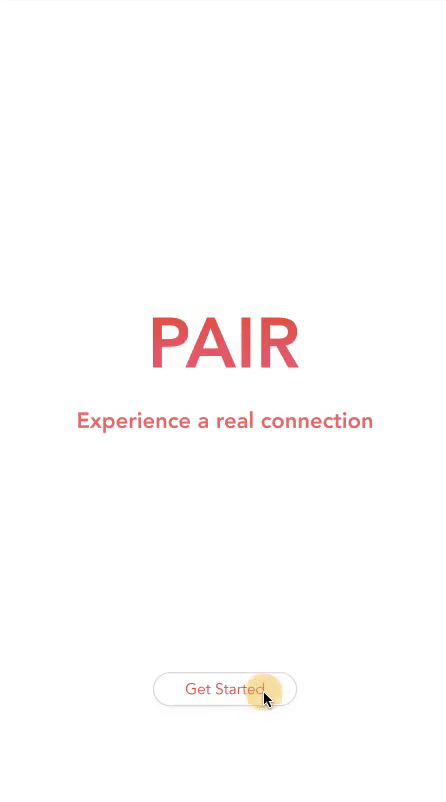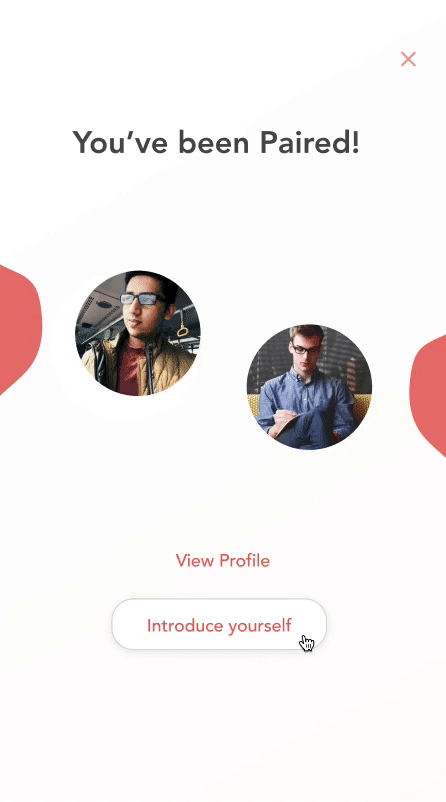Pair
Experience a real connection
Loneliness in PhD Students
Loneliness is a complex human emotion that can be described as a “subjective, negative feeling related to deficient social relations.”
We investigated this phenomenon in PhD students and designed a gamified trust-building experience where they could connect with others in their community.


My Responsibilities
• Developed the research strategy, interview guide and designed the diary study
• Assisted with creating and testing paper prototypes and iterating the design concept
• Helped set the visual tone and UI style guide and used them to design high-fidelity screens on Figma. Prototyped them using InVision.
Timeline
February - April 2019
2 months
Tools
Adobe CC, Figma,
Google Forms, Invision, Stormboard
Teammates
Modassir Iqbal, Natalie Yeh - UX Research, Product Design, Yirang Choe - Product Design
Problem
Lack of quality social interactions often manifests as a result of isolated and tiring academic lifestyles. Prolonged research struggles, unresponsive advisors, or just lonely meals, PhD students often confront competing negative emotions. How could we improve the social lives of PhD students?
According to OECD, 67449 students graduated with PhDs in just the United States in 2014, indicating the presence of a niche population that could be positively affected by our solutions.
“I have had to travel to a new country to do my PhD., far from family and friends. I struggle with loneliness constantly. I live with roommates who do not socialize. I keep asking myself if I will ever make it”
- Blog-post by a PhD student on an online forum
User Research
We needed to investigate relevant environments such as work, relationships, and social lifestyles of PhD students in two weeks and used college email lists to recruit them for our study.




Literature + Online Review
Survey
To collect quant. data & screen participants - 63 PhD students
Semi-structured Interviews
To collect qualitative data - 6 PhD students
Diary Study
To collect in-situ data and emotion samples - 4 PhD students

“I cooked lemon chicken for lunch with members of a bible-reading group. I felt excited about it because it is one of the few moments during the week when I do something other than studying alone.”
- Quote from Diary Study Reports
Key Findings and Design Implications
1. PhDs feel less connected to colleagues, friends and family in a new location and culture
It was difficult for them to have regular meaningful conversations that enabled them to create and maintain quality connections.
2. Conversation is key: quality of connections is more important than the quantity
According to the survey, having more daily social interactions did not have any effect on loneliness in PhDs. Talking to a close friend, however, always seemed to help.
3. Excessive workload means lack of time to do other things
PhD students hoped their connections would understand and wanted to engage with others in small chunks of time.
4. PhD problems are very specific
They found it hard to explain their stories to their existing connections. Perhaps an opportunity to talk about their lives with other PhD aspirants would help.
Finding the right solution


Concept 1 - Connection App (Converse with close ones)
Regularly speaking with people we care about reduces feelings of loneliness but its difficult to promote organic conversations when you’re occupied or distracted. We explored this idea using collaboratively set group chat prompts but it failed in testing because pushing to converse in close circles does not work well.
Concept 2 - Matching App (Matchmaking for PhDs based on interests)
Talking to others in your community creates belongingness but making new connections can be difficult. We built on this idea to design our final solution.
Concept 3 - Facebook + Linkedin for PhDs
Validated the need for a research centric social media platform but couldn't pursue because of time constraints
Concept 2
Matching App
We shifted our focus on the complex dynamic of trust-building in new connections, often construed as burdensome and time-taking. We empowered them to find and connect with other PhDs while the app would reveal parts of their profile as they conversed. We also identified that professional goals were just as important to aspiring PhD students, and gave them control over the information they would share with other individuals, in a gamified 'earn reveals as you converse' system.
Conceptual Success

Focus group and user test participants were excited about the novel conversational experience with smart prompts and reveals and liked the idea of switching between professional and public profiles.
Pair

Final Solution
Enables PhD students to find relevant others in their community in a subtly gamified trust-building experience.
Features
Create personal & public profiles
Public profiles info can be viewed by everyone on the platform. Add custom sections to your personal profile, like ‘recent travels’ or ‘favorite ice-creams’ that can only be viewed by Pairs.


Search & pair with PhDs you find interesting
Find new connections or ones you already know like your labmates. Use the Match Settings to filter your search.
Converse with your Pairs using smart prompts
Use smart-conversations and reveals to have easy and lively conversations.


Reveal new parts of your Pair's profile as you converse
Reveals are unlocked as you converse regularly, and allows you to unlock parts of your personal profile that you can share with your Pair.
User Flows
Create Profiles
Discover other PhDs

Converse & Reveal

Design Rationale
Evaluation


User testing
2 rounds of Lo-fi prototype
7 participants

Focus group
Concept testing and discussion
5 participants
Design Feedback
Users wanted to see features that encouraged offline meetings since nothing replaces human-human interaction.
There was also strong use case for the Community feature, participants wanted to create ‘Facebook groups’ and learn about events related to PhDs in their area.
Participants wanted conversation prompts to promote debates and discussions inside the chatrooms.

Lo-fi Prototype Testing

User testing metrics (Difficulty, Participant 2)
UI Style Guide
We iteratively built components as they fit into our high-fidelity designs and consolidated them into a single Style Guide library.

Reflection
Some stages like the initial ideation was a huge setback but we soon realized that it was also the biggest lesson - validation of solution concepts is fundamental to the design process. I learned to test often and quicker in the design process and keep different iterations during visual design.
We got to try new UX methods such as the diary study and focus group.
Lastly, we feel we have accomplished something as designers after striving to solve an intricate problem like loneliness.



